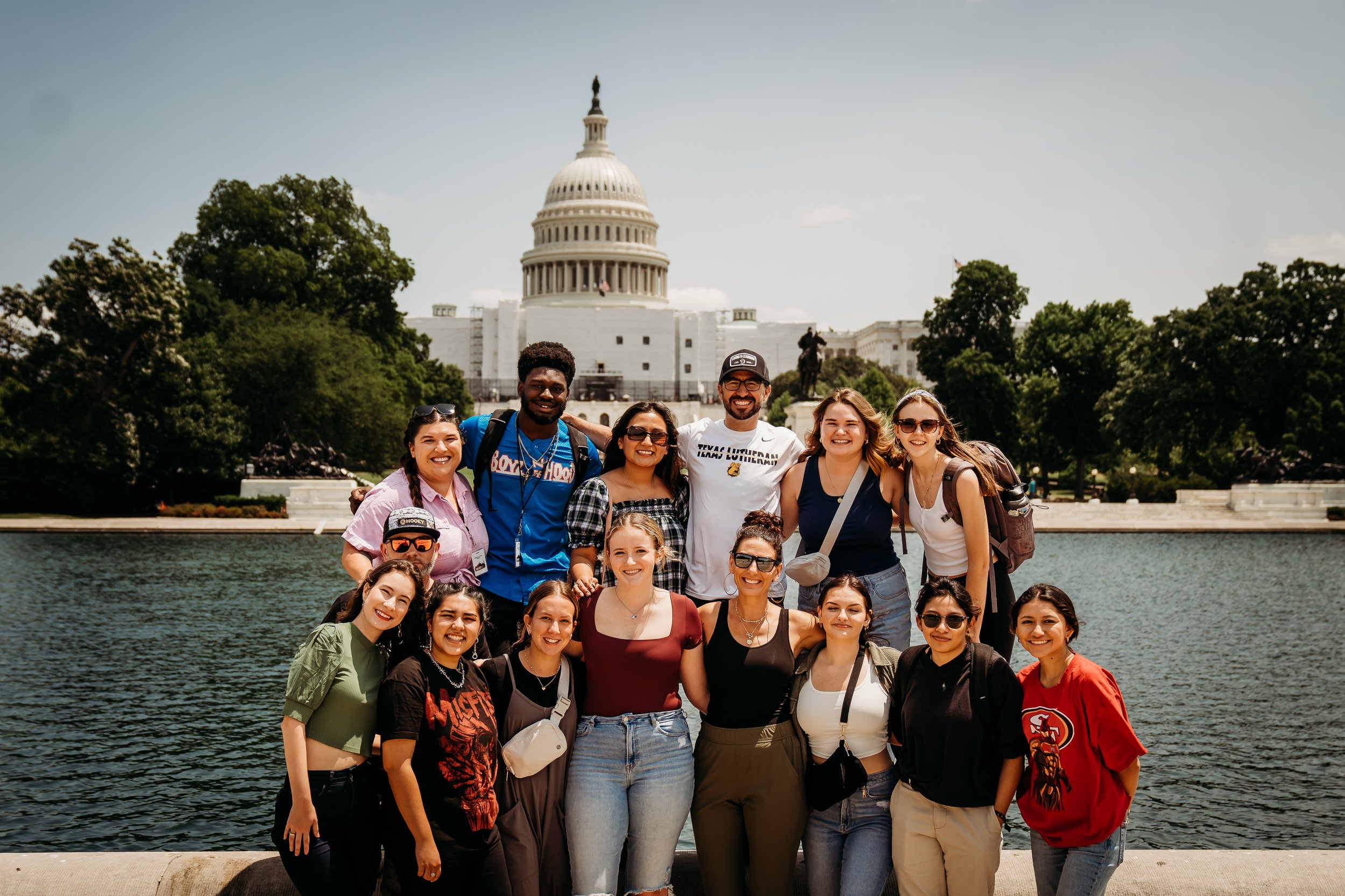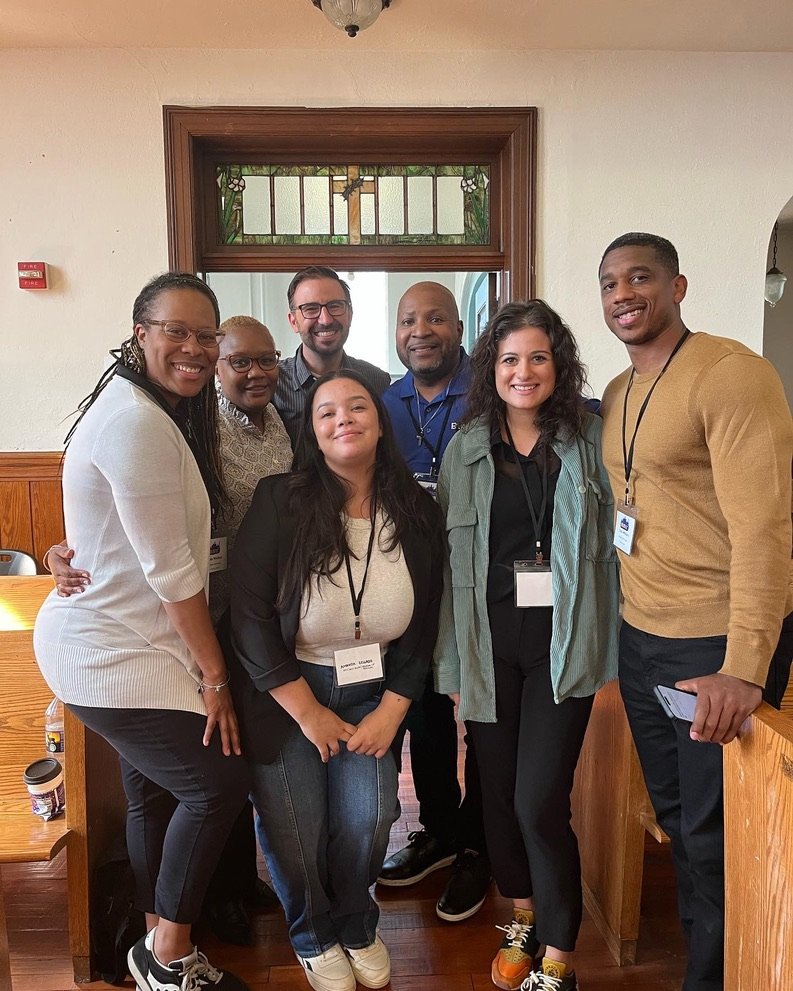
Baltimore Urban Studies
Semester Program
An Experience Like No Other
Baltimore and Washington D.C. will be your classroom as you take an unforgettable journey exploring how the complex realities of public health, social realities, political climate, professional fields, and spiritual growth are all intertwined. The Baltimore Urban Studies (BUS) is a “study away,” experiential learning program, designed to teach, mentor, and train college students in spiritual formation and public health while providing urban global health internships.
During this semester study-away program, you will gain hands-on experience and a deeper understanding of how your major can create a lasting impact on the community around you. We partner with churches, clinics, agencies, and community leaders in Baltimore and Washington D.C. to where you will experience transformative learning in these dynamic cities. We believe you will gain a new perspective on urban life as you experience the joyful work of God that’s happening in Baltimore. Study away with us and be immersed in culture, ministry, and learning.
Program Highlights
Study and live on the East Coast
Learn from expert educators and clinicians
Intern in fields related to your major. Whether you’re a ministry major or studying public health, we’ve got a spot for you
Be mentored in spiritual formation
Experiential learning in and outside of the classroom
Excursions to Baltimore’s Inner Harbor, the National Mall, and the world-renowned Smithsonian museums in D.C.
Fall and Spring Semester Courses
Students can select from the offered electives for a total of 12-18 total credits. All courses are offered during both the Spring and Fall semester.
-
This course is delivered through an intensive 3-week hybrid module combining classroom lectures, seminar discussions, and field learning experiences to facilitate an immersive introduction to public health and epidemiology. Students learn undergraduate principles of epidemiology through the lens of justice and reconciliation in the US urban context. This course allows students to learn the foundational concepts of social and behavioral health, environmental health, health systems and global health policy, and epidemiology and statistical reasoning.
-
This course provides the theological framework for the spiritual formation curriculum for Baltimore Urban Studies. Students will learn from diverse cultural perspectives as they investigate the foundational beliefs of discipleship and Christian formation. This course gives focused attention on the implications of Christian formation in an urban context, the relationship between the Church and culture, and how theology informs, guides and facilitates personal transformation and community reconciliation. A component of this course delves into equipping students to cultivate contemplative practices that will help them deepen their personal relationship with Christ.
Required Courses
-
This course provides academic scaffolding, guided reflection, seminar-based learning, and assessment for internships in the urban context. Mentorship from multicultural community leaders in private, government, non-profit, and religious agencies facilitate student learning of foundational principles of vocational praxis. Specialized semester-long internships exist for business administration, Christian ministry, church leadership, communications and leadership development, elementary and secondary education, environmental sciences, microbiology, non-profit management, psychology, refugee and immigrant community development, sociology, social work, and wholistic spiritual recovery from addiction and homelessness. This is a variable-credit course. Students earn 1 credit per 40 hours of internship - Minimum 3 credits (120 hours) & Maximum 12 credits (480 hours).
-
This course provides academic scaffolding, guided reflection, seminar-based learning, and assessment for urban public health internships. There are two options for a 120-hour internship (3 credits) or a 160-hour internship (4 credits). Internships include mentorship from multicultural Christian clinicians and learning experiences in human protection, health improvement, and health services in urban clinics and public health agencies of Baltimore, MD, and Washington DC. Students will gain an introduction to the foundational principles of public health and engage in constructivist learning from three months of urban public health learning experiences supported by academic readings, seminary discussions, and reflective writing assignments.
-
This course provides academic scaffolding, guided reflection, seminar-based learning, and assessment for Social Work Field Practice in the urban context. Practicum learning experiences include mentorship from multicultural and interdisciplinary community leaders in private, government, non-profit, and religious agencies of Baltimore, MD while completing a minimum of 400 student social work practicum hours. Learning opportunities are structured to connect social work theory with practice and develop social work skills with various client systems within an agency context utilizing theory-based practice knowledge.
Select one practicum or internship course
-
Bioethics is the study of the ethical issues that arise in the study of human biology, ecology, nursing, medicine, public health, and other biological research fields. Drawing on a variety of ethical cases from recent biomedical literature, this course covers the conceptual foundations of moral theory, principles of justice, and the application of conceptual tools developed from those principles. This course includes two units: (1) Moral theories, distributive justice theories, and the ethical treatment of patients, the environment, and communities and (2) Consideration of alternative approaches to rationing health care.
-
The disproportionate burden of HIV/AIDS in global cities coupled with a decrease in HIV mortality and morbidity provide an opportunity to apply principles of community psychology to guide student understanding of the complex interplay of environmental and individual-level drivers that influence HIV prevention, treatment, and care. This course offers a unique perspective on how social structures, neighborhoods, and individuals shape HIV prevention and care delivery particularly for communities living in urban poverty. Specific theories of participatory-action research, multi-level community interventions, structural dimensions of HIV stigma, and public health policy implications will be critically examined and discussed.
-
This course is an interdisciplinary sociology and history course challenging students to analyze the social dynamics of Baltimore City from 1861 to 2023. Critical analysis of topics including: urbanization, migration, segregation, socioeconomic dynamics, and public policy. Students learn from the historical demography and contemporary issues that define the structure and culture of Baltimore city. This narrow geographical focus enables students to generate broad and deep sociological analyses of the major social challenges of Baltimore that are shared with many other global cities; and the historical and cultural context that often garner national and international attention.
-
Epidemiology is the study of the distribution of diseases and determinants of health and illness in diverse human populations. This course provides the opportunity for students to learn the principles and methods of epidemiology, with an applied focus on global and urban case studies. All students participate in a synchronous online epidemiology laboratory (STATA) performing statistical analyses of measures of disease frequency, transmission, and graphical representations of associations between exposures, or risk factors, on health and disease outcomes. This course includes mentorship from epidemiologists and clinicians who integrate Christian faith into public health practice in domestic and international contexts.
-
This course will This course covers general aspects of undergraduate microbiology with emphasis on endemic microorganisms and human interaction. Topics include introduction to microbiology, microbial taxonomy, methods of microbial identification, immunology and infection. This course includes microscopy, staining, and microbiology laboratory applications with over 40 laboratory hours at the Baltimore Underground Science Station.
-
This course challenges students to learn the foundational principles of human nutrition across the lifespan. Students learn physiology and functional science of nutrition from all 24 chapters of Discovering Nutrition (Insel et al.). Additionally, the course includes 10 public health nutrition laboratory experiences. Nutrition laboratory includes analysis of the factors, systems, and structures that impact dietary patterns, dietary behaviors, food assistance, and safety net programs in the US. Students explore the policies, history, and complexities of urban access to healthy food and gain an introduction to the physiological, psychological, and socio-cultural factors that affect eating behaviors.
Various Elective Courses

Internships
Our semester program includes a built-in internship opportunity where students will participate in 120-480 hours of internship work in community health clinics and agencies in Baltimore. The Urban Public Health course accompanied by the internship provides a seminar-based model of learning for students to process and gain constructivist learning from their three months of individualized internship experiences through academic readings, seminar discussions, and reflective writing assignments.
Internship placement examples:
-
Intern in a medical clinic or the counseling services provided through this high school.
-
Immigration and Refugee services for Arabic speakers.
-
Biomedical laboratory and public health outreach programs.
-
Faith-based Community Organizing and public policy development.
-
A longstanding nonprofit organization providing comprehensive services and spiritual recovery for men, women, and children affected by addiction and unhoused communities. Clinicians from Johns Hopkins Hospital collaborate with Helping Up Mission.
-
Clinical services in psychology, audiology, speech pathology, and public health education and nutrition outreach.
-
A duel language in Spanish & English Catholic Community School for multicultural Pre-K - 8th-grade students.
-
Community empowerment and wholistic community health programs based in an urban church in West Baltimore.
Calendar
The semester is 16 weeks in length and each Fall term begins at the end of August and ends in early December. The Spring term begins mid-January and ends at the end of April.
-
Jan 10 - Students Arrive & Orientation Starts
Jan 15 - Intro Public Health starts
Jan 31 - Intro to Public Health final presentations
Feb 1-2 - Reading Days & Excursions
Feb 5 - Internship and classes start
April 22 & 23 - Final Exams
April 24-25 - Debrief
April 26 - Students Depart
-
August 21 - Students Arrive & Start Orientation
August 26 - Intro to Public Health Starts
September 11 - Intro to Public Health Final Presentations
September 12-13 - Reading Days & Excursions
September 16 - Internships & Classes Start
December 2-3 - Final Exams
December 4-5 - Debrief
December 6 - Student Departure
-
Jan 8 Students Arrive & Start Orientation
Jan 13 Intro to Public Health Starts
Jan 29 Intro to Public Health Final Presentations
Jan 30 & 31 Reading Days & Excursions
Feb 3 Internships & Classes Start
April 21 & 22 Final Exams
April 23 & 24 Debrief
April 25 Student Departure
A Letter from the Directors
Dear Students, Parents, Community Leaders, and Collaborating Faculty,
Baltimore Urban Studies (BUS) is a “study away,” experiential learning program, designed to teach, mentor, and train Christian college students in spiritual formation and public health while providing urban global health internships. The foundation of the BUS began twenty years ago at Wheaton College in Illinois. Starting in 2001, we had the privilege of working together to encourage, equip, and challenge students to engage in global urban learning.
After two decades of Danté Upshaw working in spiritual formation and urban pastoral ministry and Micah Hughes working in global health and higher education praxis, our paths have come together again to establish the BUS. In 2020, Living and Learning International responded to the challenging questions of our time and reached out to us. Amidst the inequities, struggles, and tragedies, what could bring hope and true healing to communities in America? We believe that Jesus Christ is facilitating an awakening in our society and in the Church today. Joining in this movement, we are partnering with local clinicians and diverse educators to mentor undergraduate health science students in the inward journey of spiritual formation and outward applications of justice and reconciliation
We believe that a semester away at the BUS could be the spiritual and academic catalyst many students need to discern their post-graduate vocation. There is an increasing need for Christian practitioners in all areas of healthcare practice to have a deeply formed inner life as they seek with wisdom and compassion to impact individuals and communities. Our nation and the world continue to battle the onslaught of a global pandemic that has illustrated once again a disproportionately devastating effect on the health and livelihood of African-American, Latinx, and Native communities.
We are grateful to partner with several dynamic Baltimore agencies, churches, clinics, and transformational community leaders. Whether students participate in our short-term study experiences or our "semester away" programs, they will earn college credit through several exciting public health and global community health internship options. It is our prayer that as students live and learn in Baltimore, they will have a deeply transformative experience that will equip them to be anchored ambassadors for Christ and grow in their abilities as healthcare professionals and agents of reconciliation.
Micah S. Hughes, PhD. MSc
Academic Director &
Associate Professor
Danté Upshaw, Rev
Program Director &
Campus Pastor

Program Cost
Depending on the opportunity you select, you will need to check with your college or university for exact costs. However, in most cases, if you are a student at one of our partner schools a semester in Baltimore will not cost you more than what you are currently paying for school! If you are not currently enrolled in a college or university and would still like to attend, contact us.
Pricing Breakdown:
$14,000 - Tuition
$2,800 - Room and Board
$16,800 - Total Program Cost
Cost Includes:
Tuition for 14-18 credit hours
Arrival and departure airport transportation from Baltimore Washington International Airport
On-Campus Housing (12 - 14 weeks)
1/3 of all meals during program
Full-Time onsite staff and support
Public transportation pass for travel in Baltimore and Washington DC
Multiday education excursions to Washington DC and New York city
Select museum and excursion fees when part of a class learning experience.
Does Not Include:
Airfare
Meals when not with the program
Personal expenses like shopping, personal needs, or personal travel.





